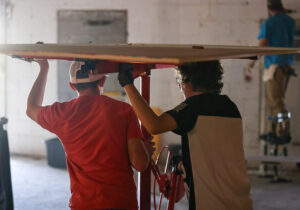Living History
By Darren Blair
This past week, Pope Francis visited the United States. This was his first visit to the United States, and only the seventh official papal visit since 1984, when the United States began full diplomatic relations with the Holy See. In other words, history was just made.
This weekend, October 3 and 4, will be 5 of the 6 sessions of General Conference, a bi-annual event in which the leadership of the Church of Jesus Christ of Latter-day Saints directly address the membership the world over. Even under normal circumstances, most members of the church greet Conference eagerly because they desire to hear everyone speak. But this Conference? It’s the first time in almost 110 years that there have been three simultaneous openings in the Quorum of the Twelve, a body of senior leaders who – along with the three-member First Presidency – officially run the church. This alone represents history being made. Conference, which is where such vacancies are officially filled, will further be historic for this reason.
The Presidential debates? History. The ongoing conflict in the Middle East? History. The evening news? History.
It may sound pretentious at first to refer to everything as history. However, folks, the truth of the matter is that we’re living history as it is happening. We may not notice it because of what we ourselves are busy doing, but this is, indeed the case. In some cases, we may only be bystanders, watching as the world goes by. But in other cases, we may have a relationship to what takes place.
For example, last weekend I had to explain to my mom that the upcoming film “Truth”, if the trailer was to be believed, doesn’t contain any. The film is a docudrama about the 2004 Killian Documents Controversy [https://en.wikipedia.org/wiki/Killian_documents_controversy ], wherein some of CBS News’ top stars saw their careers ruined after they violated the basic tenets of journalism. They were in such a hurry to air a story about how then-President George W. Bush may not have properly fulfilled his obligation to the Texas Air National Guard that they failed to make sure that the documents they were using as source material were legit. As if that wasn’t bad enough, the producer involved in the story was in constant contact with the John Kerry election campaign, something that even a top Kerry staffer recognized was inappropriate. The film, however, takes the perspective that the news team were justified in doing what they did, and that they were punished not for their journalistic sins but for “asking questions”, as the trailer so puts it.
How do I know that the film is grossly distorting what happened?
I’m one of the so-called “Pajamahadeen”, the chorus of internet voices that kept calling CBS News out over the matter. I wasn’t one of the individuals who spotted the forgeries during the initial broadcast. Rather, I found out about it the next morning like most of the other people on the internet, at which point I began digging into whatever news emerged. I, and my fellow internet denizens, didn’t like what was going down and so spread the word.
In other words, although it was only tangentially, I can still say I was involved in Memogate. (And no, conflict-of-interest concerns mean I likely won’t be reviewing the film professionally.)
Folks, take a few minutes each day to see what’s going on in the world around you. You may refer to the senior citizens and others in our midst as “living history”. But one day, it could be you who people speak of like this.
Darren Blair’s article was originally published in the 2 October 2015 Copperas CoveLeader-Press newspaper. pages A6 and A7 .






